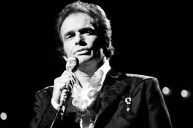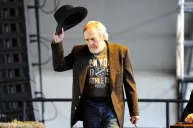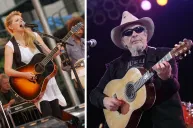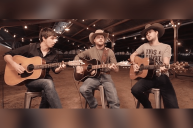Ol' Merle Haggard is one of those country behemoths who had cemented themselves as legends early in their career. Since then, Haggard has put out hit after hit -- infusing toe-tapping jams with purpose and meaning. One of Haggard's most hotly contested songs is "Okie from Muskogee." In order to understand the meaning behind the "Okie from Muskogee" lyrics, we have to start at the story's origin point and work our way forward from there!
Videos by Wide Open Country
"Okie from Muskogee" is technically credited as being a song by Merle Haggard and The Strangers -- Haggard's backup band. Haggard wrote the song alongside a drummer, Roy Edward Burris. It was the main attraction of Haggard's first live album... also named Okie from Muskogee. The song was an immediate winner when it was released in September 1969. Only two months after its release, the song found itself at the top of Billboard's Hot Country Singles chart. It would hold that #1 spot for the following four weeks!
The song, along with the album, was named the Country Music Association Single and Album of the Year in 1970. Now, with all the preamble out of the way, we can get down to brass tacks! Watch out, though. We're also about to get a little heavy in subject matter. So, "Okie from Muskogee" was written in response to the Vietnam War.
What Is 'Okie from Muskogee' About?
Haggard revealed his inspirations in an interview with The Boot. "When I was in prison, I knew what it was like to have freedom taken away. Freedom is everything," Haggard begins. "During Vietnam, there were all kinds of protests. Here were these [servicemen] going over there and dying for a cause -- we don't even know what it was really all about -- and here are these young kids, that were free, b---hing about it."
"There's something wrong with that and with [disparaging] those poor guys. We were in a wonderful time in America, and music was in a wonderful place. America was at its peak, and what the [heck] did these kids have to complain about? These soldiers were giving up their freedom and lives to make sure others could stay free. I wrote the song to support those soldiers."
We don't smoke marijuana in Muskogee / We don't take our trips on LSD.
We don't burn our draft cards down on Main Street / 'Cause we like living right, and being free.
Merle Haggard Couldn't Believe The World Around Him
Listening to the song paints a portrait of a specific time in American culture. A time when those who hated war let themselves be heard, and those who identified as "real Americans" couldn't understand why anyone would "disgrace" the country in such a manner. In the song, Haggard seems to subtly attack anti-war "hippies."
However, along the course of my research, I did uncover an interesting perspective! One Redditor brought forth the idea that the song was actually meant to be more satirical than a super-serious condemnation of anti-war protestors. "There's good indication that it was originally written as a joke, lightly poking fun at the people he was singing to on tour in Oklahoma... but they took to the song and embraced it, and he knew he had something bigger on his hands," the post begins.
"It winds up being a much stronger political statement than he meant because it was released back-to-back with 'Fighting Side of Me,' which was a more direct reaction to his feelings on people talking negatively about the country."
We don't make a party out of loving / But we like holding hands and pitching woo.
We don't let our hair go long and shaggy / Like the hippies out in San Francisco do.
Time Changes Merle Haggard's 'Okie from Muskogee'
In truth, the song changed in meaning as Haggard aged and became more wise to the world around him. The country legend would admit as much in a later interview. "I had different views in the '70s. As a human being, I've learned [more]. I have more culture now. I was dumb as a rock when I wrote 'Okie From Muskogee'. That's being honest with you at the moment, and a lot of things that I said [then] I sing with a different intention now," Haggard stated.
"My views on marijuana have totally changed. I think we were brainwashed and I think anybody that doesn't know that needs to get up and read and look around, get their own information. It's a cooperative government project to make us think marijuana should be outlawed." Truthfully, it's a fascinating aspect of Merle Haggard to explore.
One could easily say it sounded like he meant what he said in his interview with The Boot earlier in his career and pivoted later when it seemed to fall "out of style" societally. Or, his later views and perspectives came as a result of organic growth and reflection. People are allowed to change their minds and absorb new perspectives over time!
Leather boots are still in style for manly footwear / Beads and Roman sandals won't be seen.
And football's still the roughest thing on campus / And the kids here still respect the college dean.
Is 'Okie from Muskogee' Ironic?
Uh... your mileage may vary on that one. For some, it's "an immediate connection to a time, culture, society, etc. that I was never actually a part of." For others, it's a tongue-in-cheek satire that pokes fun at the good and bad of a certain set of values while embracing the culture those values come from. I hate to offer y'all such a vague answer, but that's art, baby!
It's funny that the song inspired so many parody songs after the fact, though. There's the Youngbloods' "Hippie From Olema," David Peel's "Hippie From New York City," and -- my personal favorite -- Chinga Chavin's "A--hole from El Paso." Fun fact: Kinky Friedman's cover of "A--hole from El Paso" is now closer in association with Friedman than Chavin.
So, to be clear, that's a cover of a parody of an original song, but the parodied cover became the de facto cover and less of a parody. Did you get all of that?
And I'm proud to be an Okie from Muskogee / A place where even squares can have a ball.
We still wave Old Glory down at the courthouse / And white lightning's still the biggest thrill of all.
In Conclusion
Look, I could sit here all day and argue with y'all about the politics behind the song. However, I'm choosing peace over violence today! I have a pleasant note I'd like to leave this piece on. Shortly before his passing, Haggard had an interview with Mother Church Pew. Something that stuck out to me was how he viewed the modern, "glittery" landscape of music against the grittiness of the music he pioneered decades ago.
"[Producers] record someone today then send him to a training school to teach him how to perform. I believe that is backward. A true performer is going to know his craft before he ever goes into the studio. Artists need to know what they're doing. They should have a plan and a hit song." One thing is indisputable: Merle Haggard was an artist first and a "product" last.




